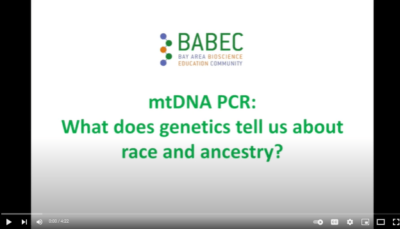Curricula
 mtDNA PCR: What does Genetics tell us about Race and Ancestry?
mtDNA PCR: What does Genetics tell us about Race and Ancestry?
This lesson introduces students to fundamental molecular biology tools, PCR and DNA sequence analysis, which can help us understand human ancestry and genetics. Furthermore, it provides a unique opportunity to examine scientific evidence that discredits the notion of distinct biological races within the human species. During the lab, students extract DNA from their cheek cells, perform PCR on the HVR1 region of their mitochondrial DNA, and submit the samples to BABEC for sequencing. Students then identify their haplogroup using SnapGene software and the MitoMap online database, which gives them insight into their deep maternal ancestry. Lastly, they use multiple pieces of evidence from the lesson resources and lab results to construct an explanation for the question: Does your DNA tell you your race, ancestry, or both?
In our online version of the lesson, students analyze PCR samples matched with the self-identified race/ethnicity of a group of anonymous individuals. They also engage with a POV video of a student performing the steps of the lab and labeled pictures of all the lab equipment involved.
Learning Objectives
- Perform DNA extraction, PCR, and DNA sequence analysis to determine your own mtDNA haplogroup*
- Describe mtDNA and the features that make it a useful tool for studying ancestry
- Compare and contrast the concepts of “race” and “ancestry” and construct an explanation for the following question: Does your DNA tell you your race, ancestry, or both?
Prior Knowledge
- Structure and function of DNA
- Role of mitochondria in the cell
- Experience with DNA extraction, micropipetting and gel electrophoresis
In order to access any Curriculum resource, please or if you haven't already done so.
Disciplinary Core Ideas:
LS3-A Inheritance of Traits<
“…some segments of DNA are involved in regulatory or structural functions…”
LS3-B Variation of Traits
“…errors do occur [in DNA replication] and result in mutations, which are also a source of genetic variation…and viable mutations are inherited.”
Science and Engineering Practices:
Analyzing and Interpreting Data
Constructing Explanations
Students explain the role of genetics in determining someone’s race and ancestry using mtDNA haplotype data from analyzing their own DNA sequences and gathering information from outside sources.
Crosscutting Concepts:
Patterns
Cause and Effect
Students explore the relationship between someone’s DNA and their race and ancestry.
In order to access any Curriculum resource, please or if you haven't already done so.


